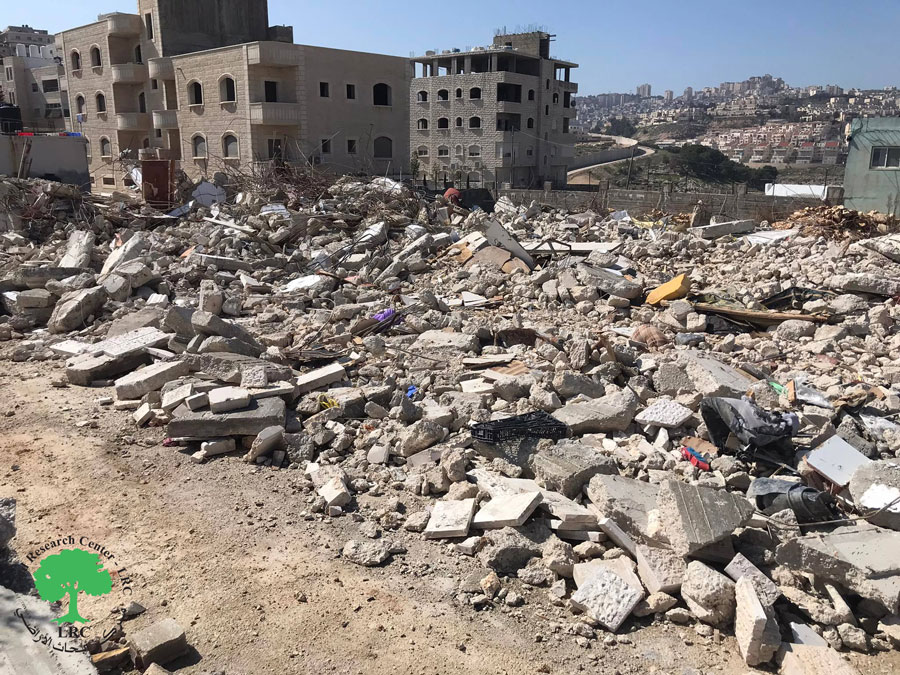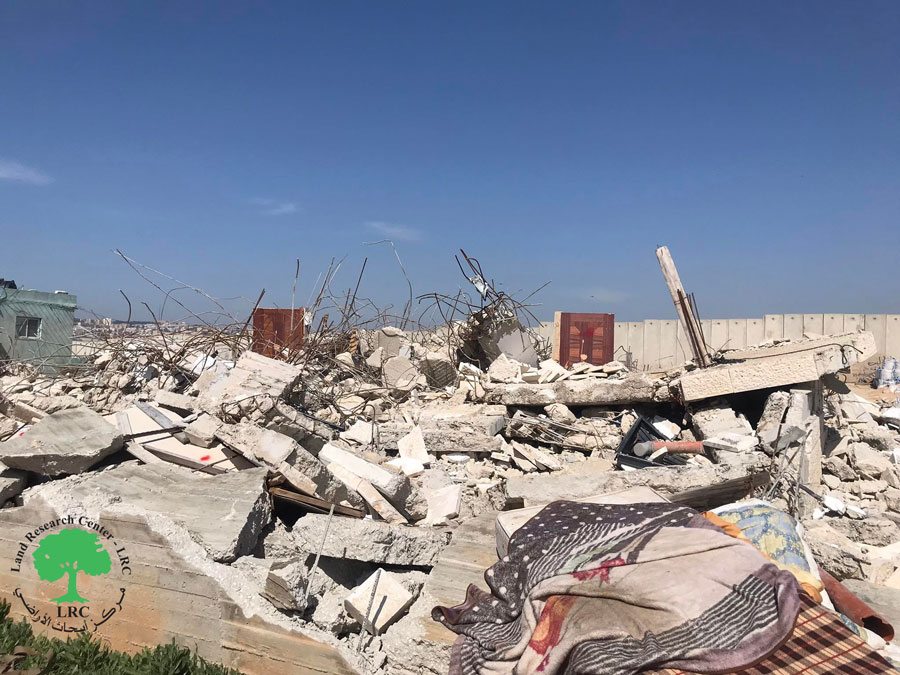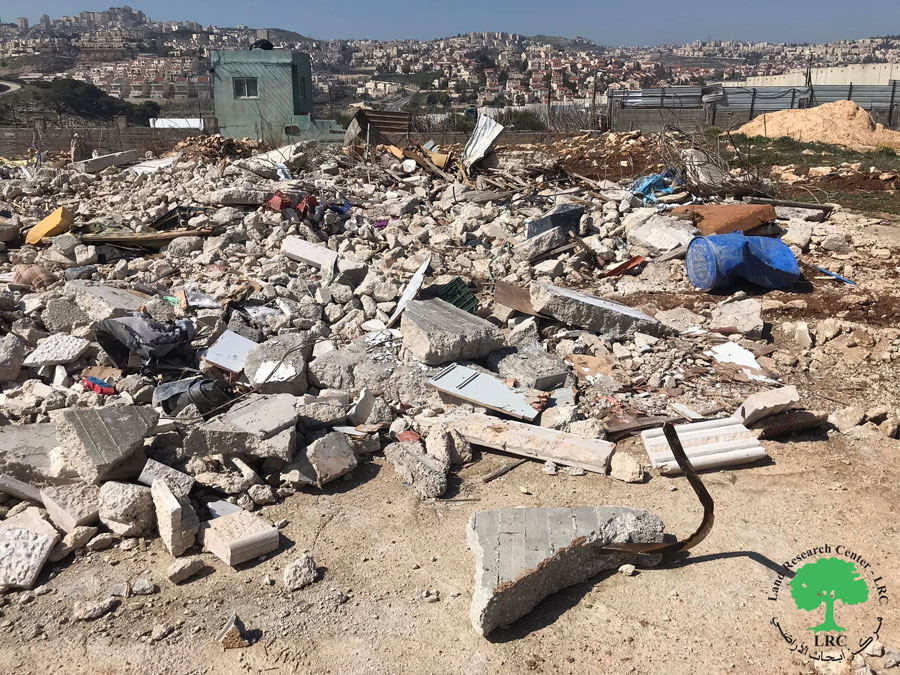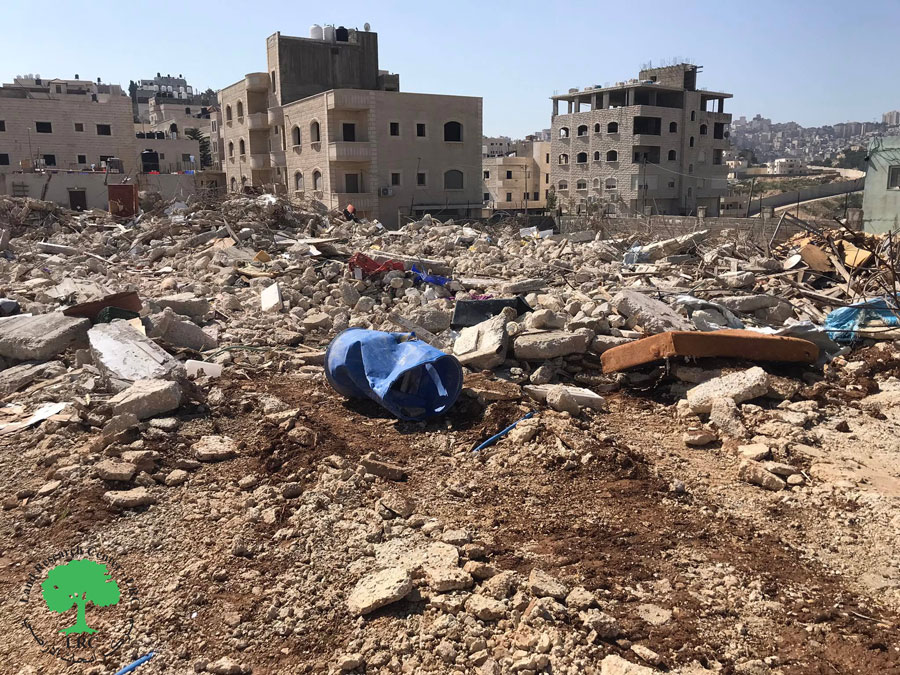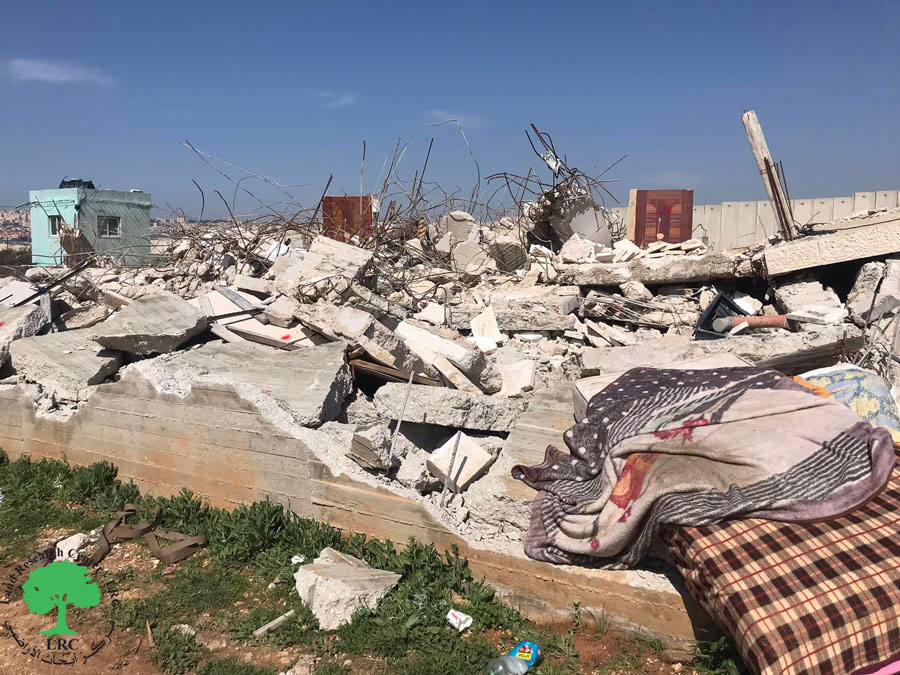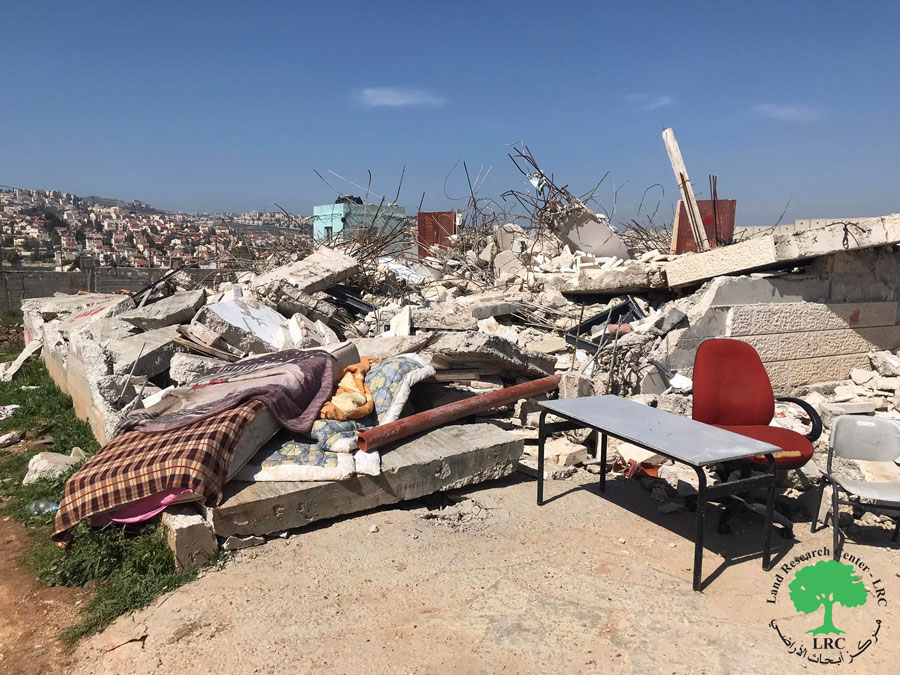2022-02-24
الاحتلال يهدم بناء مكون من شقتين لعائلة الفهيدات في بلدة عناتا / القدس المحتلة
أقدمت سلطات الاحتلال في صباح يوم الخميس الموافق الرابع والعشرين من شباط 2022، على اقتحام حي البقعان الى الشرق من قرية عناتا، مصحوبة بالجرافات وبالقوات الأمنية، على هدم منزل المواطن رائد حجاج الفهيدات، وذلك دون سابق انذار وبحجة عدم وجود ترخيص قانوني بالبناء.
يشار الى أن المسكن مكون من شقتين بمساحة حوالي 150 متر مربع لكل منهما وبتكاليف بناء زادت عن 500 الف شيقل- حوالي 160 الف دولار أمريكي - مبني من العام 2016، وقد تلقى مالك المسكن إخطاراً بوقف البناء، وبناءً عليه تقدم عبر المحامي بطلب اعتراض حول قرار ايقاف العمل، الا أن الإدارة المدينة وبشكل مفاجئ قد داهمت المكان ونفذت الهدم بدون علم المالك، ولم يستلم المالك اي قرار مكتوب حول عملية الهدم التي تمت.
يشار الى ان عائلة المالك مكونة من 5 أفراد من الأم والأب وابنتين وولد -، وكانوا يسكنون إحدى الشقق التي هدمها الاحتلال، والمكونة من أربعة غرف وملاحقها، وأما الشقة الثانية فهي جاهزة ولكنها خالية في هذا الوقت.
اشار مالك البيت، الى صعوبة الموقف وحزنه إثر ما حدث، وذكر ان البلدية لم تهدم بيته فقط، بل جلبت عمال لينقلوا اثاث البيت قبل الهدم، والذي وجد معظمه محطم بسبب عملية النقل السريعة. بالاضافة الى ذلك، فشبابيك البيت وأبوابه قد تدمرت ايضا بسبب هذا الفعل، وعبّر فهيدات ان عائلته بعدما فقدت بيتها اضطرت قسرياً ان ترحل الى بيت شقيقه لوقت غير معروف.
تقع قرية عناتا الى الشمال الشرقي من مدينة القدس، ويحدها الجدار من كل اطرافها، ويضيق الخناق على سكانها، سواء بالهدم او منعه، او بمساحة ارض القرية المتبقية بعد قضم الاحتلال معظمها، ويعد وجود جدار الفصل حول القرية من الذرائع الشائعة لدى الاحتلال لتبرير عمليات الهدم، كما هو الحل في بيت عائلة فهيدات.
|
بلدة عناتا[1]:
تقع بلدة عناتا على بعد 10 كم شمال شرق مدينة القدس ويحدها من الشمال بلدة حزما ومن الغرب بلدة شعفاط ومن الشرق بلدة العيزرية ومحافظة أريحا ومن الجنوب بلدة العيسوية.
يبلغ عدد سكانها ( 16,919 ) نسمة حتى عام ( 2017 )م.
تبلغ مساحتها الإجمالية 24,026 دونم، منها 1,880 دونم عبارة عن مسطح بناء للقرية.
وصادر الاحتلال من أراضيها ما مساحته (5727) دونم وفيما يلي التوضيح:
1- نهبت المستعمرات من أراضي القرية مساحة (2768) دونم ، وهي:
اسم المستعمرة | سنة التأسيس | مساحة الأراضي المصادرة / دونم | عدد المستعمرين |
ألون | 1990 | 314 | 38,992 |
كفار أدوميم | 1979 | 817 | 1,866 |
نفي برات | 1992 | 850 | غير متوفر |
علمون - عناتوت | 1983 | 787 | 726 |
2- نهبت الطرق الالتفافية ما مساحته ( 1,301) دونم، وهي الطرق الالتفافية رقم 1، ورقم 437، ورقم 458.
3- نهب الجدار العنصري تحت مساره ( 341) دونم ، وعزل خلفه( 506 ) دونم. ويبلغ طوله ( 3,416 ) متراً. في حال استكمال الجدار المخطط على أراضي القرية فإنه سيعزل (16,026 دونماً )، طول الجدار المخطط 16,806م.
4- يقام على أراضي عناتا معسكرات لجيش الاحتلال نهبت ما مساحته (1,317) دونم
تصنيف الأراضي حسب اتفاق أوسلو للقرية:
- مناطق مصنفة B ( 902) دونم.
- مناطق مصنفة C ( 23,124 ) دونم.
[1] المصدر: وحدة نظم المعلومات الجغرافية - مركز أبحاث الأراضي.
تعقيب قانوني:
إن ما تقوم به سلطات الاحتلال من عمليات هدم للمساكن والمنشآت الفلسطينية يأتي ضمن انتهاكاتها للقانون الدولي والإنساني، وانتهاك حق من حقوق المواطنين الفلسطينيين الذي كفله القانون الدولي والمعاهدات الدولية وهو الحق في سكن ملائم، ضمن المواد التالية:
المادة 147 من اتفاقية جنيف الرابعة والتي تنص على أن 'تدمير واغتصاب الممتلكات على نحو لا تبرره ضرورات حربية وعلى نطاق كبير بطريقة غير مشروعة وتعسفية.' تعتبر مخالفات جسيمة للاتفاقية .'.
المادة 53 من اتفاقية جنيف الرابعة لعام 1948 تحرم تدمير الممتلكات، حيث تنص هذه المادة على ما يلي: 'يحظر على دولة الاحتلال أن تدمر أي ممتلكات خاصة ثابتة أو منقولة تتعلق بأفراد أو جماعات، أو بالدولة أو السلطات العامة، أو المنظمات الاجتماعية أو التعاونية، إلا إذا كانت العمليات الحربية تقتضي حتماً هذا التدمير.
المادة 33 من اتفاقية جنيف الرابعة تنص على أنه : 'لا يجوز معاقبة أي شخص محمي عن مخالفة لم يقترفها هو شخصياً.
كما حذرت الفقرة 'ز' من المادة 23 من اتفاقية لاهاي لعام 1907م من تدمير " ممتلكات العدو أو حجزها، إلا إذا كانت ضرورات الحرب تقتضي حتما هذا التدمير أو الحجز.
المادة 17 من الإعلان العالمي لحقوق الإنسان، المؤرخ في 10 كانون الأول 1948 تنص على انه " لا يجوز تجريد أحد من ملكه تعسفا ".
